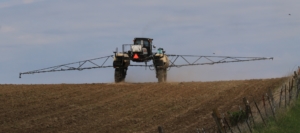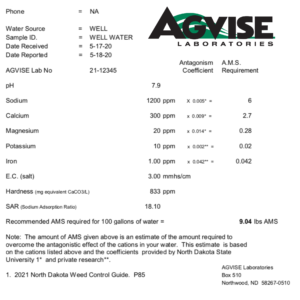How Much AMS Does Your Spray Water Need?
AGVISE Laboratories Spray Water Analysis
Hard water is a fact of life for those of us in the northern Great Plains and Prairie Provinces. It is why our homes have water softeners, why our well water tastes funny (or delicious), and one reason we need to add AMS (ammonium sulfate) or UAN to our spray tanks to optimize weed control.
When we talk about conditioning “hard water” for herbicide applications, we are preventing dissolved salts (calcium, magnesium, sodium, potassium, and iron) in water from antagonizing, or binding, the pesticide we’re putting in the tank. Dissolved salts bind to weak-acid, salt-formulated pesticides and reduce their efficacy (e.g. glyphosate [RoundUp], growth regulators, ACCase inhibitors [Select, Axial, etc.], ALS inhibitors [Pursuit, Express, etc.], HPPD inhibitors [Callisto etc.], and glufosinate [Liberty]).
A water conditioner like AMS prevents salts in spray water from binding to pesticides. AMS is most often recommended at rates from 8.5 to 17 lb/100 gal spray volume on herbicide labels. This is a wide window, however, and handling dry AMS can be a pain. So, how do you know how much AMS you should add to the tank to overcome antagonism?
A spray water analysis!
An example of an AGVISE Laboratories spray water report
AGVISE Laboratories provides fast and convenient analysis of spray water used for pesticide applications. The Spray Water Analysis package includes calcium, magnesium, sodium, iron, pH, salt, hardness, and SAR (sodium adsorption ratio). The spray water report uses NDSU data to determine the recommended amount of AMS required per 100 gallons of water to overcome antagonism. You will want to test each water source you use for pesticide applications. This information can help avoid problems throughout the spraying season.
Give us a call in either Benson, MN, or Northwood, ND and we will send you a water sample kit. Each kit contains a water collection jar and a sample information sheet. Water sample tests are completed within a week and results are emailed to you, so you have information on your water source right away.
Don’t let salts take away from your weed control this summer – get your spray water tested!


